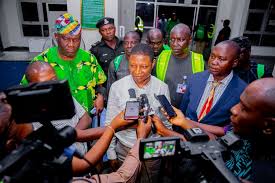African trade unions under the aegis of African Trade Unions Migration Network (ATUMNET) have unanimously agreed to change the narratives about the situation of migrant workers from the continent.
At the just concluded 3-day capacity building workshop for trade union focal persons on labour migration and journalists held in Kigali, Rwanda, the group said the action became imperative so as to influence policies that promote rights of migrant workers.
They further said instead of dwelling on the negative side, which is the abuses migrant workers suffered, it’s time to celebrate the contributions migrant workers were making in the society.
The workshop which held between December 19 – 21 was organised by ITUC-Africa with support from the International Labour Organisation (ILO), attracted journalists and labour migration focal persons from trade union organisations from different African countries.
The workshop was targeted at building their capacity on result-based projects that promote fair and ethical recruitment of labour migrants, as well as end exploitation of migrants workers.
Speaking further on the import of the workshop, Deputy General Secretary ITUC-Africa Comrade Joel Odigie said the workshop was necessitated by the need to sharpen the skills and knowledge of trade unions’ migration focal persons to be able to increase their engagement on fair recruitment initiatives at country level “so that we can achieve the goal of better protection of the rights of migrant workers.”
He said: “Our training was focused on how to make trade unions’ engagement result-based. So we are focusing more on result based approaches to our work. Our expectations are very direct. We want to see outputs and outcomes that are clear, that we can celebrate. We want to see that these persons go back and begin to redesign their campaigns in a way that can help them achieve the necessary results.”
Odigie further said: “As we speak today, migration discourse at the national level cannot happen without trade unions. In most countries, Trade unions are setting the pace and leading the agenda on how to achieve better labour migration governance.”
Also speaking, the ILO Regional labour migration specialist based in ILO office in Abidjan, Coumba Diop, said the ILO was committed to building the capacity of trade unions as a social partner, to continue in their work of promoting rights of migrant workers.
“One of the focus of this capacity building was to support them to report better, to report on results and not activities – the change that we want to see happening. So we hope that they will go back home and work on advocacy campaigns, to for example, get the ratification and domestication of labour migration conventions. Unfortunately, we are lagging behind with the ratifications of recommendations that are relevant to labour migration.
“For Example, C181 on fair recruitment. Trade unions need to do more. They need to really carry the voices of migrant workers. We expect that after this workshop they will have all the materials and the commitment as well as the capacity to do what is necessary to advance the protection of migrants from Africa,” said the labour leader.
“The experience here has been very positive. It is very important for the ILO to make sure we work with our social partners – government, employers and workers organisations. We usually say that we bring our technical capacity, but they are the ones who use that capacity to make the change happen in the field. And for us it is important to build the capacity of social partners, (in this case, the trade unions) so that they can convey the message and then make the changes in the field. When I say in the field, its at national, subregional and regional levels,” the specialist also said.
In her remarks, the labour migration focal person from Central Organisation of Trade unions (COTU) Kenya, Ms Teresa Wabuko, spoke on her experience at the workshop, expressing the readiness to engage further with migrants workers in Kenya.
She said COTU Kenya was already setting up a migrant resource centre to allow for a more structured way of handling migrant workers issues, adding that the lessons learnt from the Kigali workshop would help in developing new strategies for protecting migrant workers in Kenya.



